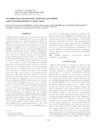Please use this identifier to cite or link to this item:
https://accedacris.ulpgc.es/jspui/handle/10553/77934
| Title: | Increased serum serotonin improves parturient calcium homeostasis in dairy cows | Authors: | Hernández Castellano, Lorenzo Enrique Hernandez, Laura L. Weaver, Samantha Bruckmaier, Rupert M. |
UNESCO Clasification: | 3104 Producción Animal | Keywords: | 5-hydroxy-l-tryptophan Calcium Hypocalcemia Serotonin |
Issue Date: | 2017 | Journal: | Journal of Dairy Science | Abstract: | Hypocalcemia in dairy cows is caused by the sudden increase in calcium demand by the mammary gland for milk production at the onset of lactation. Serotonin (5-HT) is a key factor for calcium homeostasis, modulating calcium concentration in blood. Therefore, it is hypothesized that administration of 5-hydroxy-l-tryptophan (5-HTP), a 5-HT precursor, can increase 5-HT concentrations in blood and, in turn, induce an increase in blood calcium concentration. In this study, 20 Holstein dairy cows were randomly assigned to 2 experimental groups. Both groups received a daily i.v. infusion of 1 L of either 0.9% NaCl (C group; n = 10) or 0.9% NaCl containing 1 mg of 5-HTP/kg of BW (5-HTP group, n = 10). Infusions started d 10 before the estimated parturition and ceased the day of parturition, resulting in at least 4 d of infusion (8.37 ± 0.74 d of infusion). Until parturition, blood samples were collected every morning before the infusions, after parturition samples were taken daily until d 7, and a final sample was collected on d 30. Milk yield was recorded during this period. No differences between groups were observed for blood glucose, magnesium, and β-hydroxybutyrate. Cows receiving the 5-HTP infusion showed an increase in fatty acid concentrations from d -3 to -1 before parturition. Serum 5-HT concentrations were increased at d -4 related to parturition until d 5 postpartum in the 5-HTP group compared with the C group. In addition, cows from the 5-HTP group had increased 5-HT concentrations in colostrum, but not in mature milk, on d 7 postpartum. Serum calcium concentrations decreased in both groups around parturition; however, calcium remained higher in the 5-HTP group than in controls, with a significant difference between groups on d 1 (1.62 ± 0.08 vs. 1.93 ± 0.09 mmol/L in control and 5-HTP groups, respectively) and d 2 (1.83 ± 0.06 vs. 2.07 ± 0.07 mmol/L in control and 5-HTP groups, respectively). Additionally, colostrum yield (first milking) was lower in the 5-HTP group compared with the C group, but without consequences on colostrum IgG concentrations. Milk yield did not differ between groups during the rest of the experiment. The study data were consistent with the concept that infusion of 5-HTP to dairy cows increases blood 5-HT concentrations, which in turn is a significant regulatory component in the chain of effectors that affect calcium status around parturition, hence the occurrence of clinical or subclinical hypocalcemia. | URI: | https://accedacris.ulpgc.es/handle/10553/77934 | ISSN: | 0022-0302 | DOI: | 10.3168/jds.2016-11638 | Source: | Journal of Dairy Science [ISSN 0022-0302], v. 100(2), p. 1580-1587 |
| Appears in Collections: | Artículos |
WEB OF SCIENCETM
Citations
53
checked on Jun 8, 2025
Page view(s)
112
checked on Sep 14, 2024
Download(s)
237
checked on Sep 14, 2024
Google ScholarTM
Check
Altmetric
Share
Export metadata
Items in accedaCRIS are protected by copyright, with all rights reserved, unless otherwise indicated.
